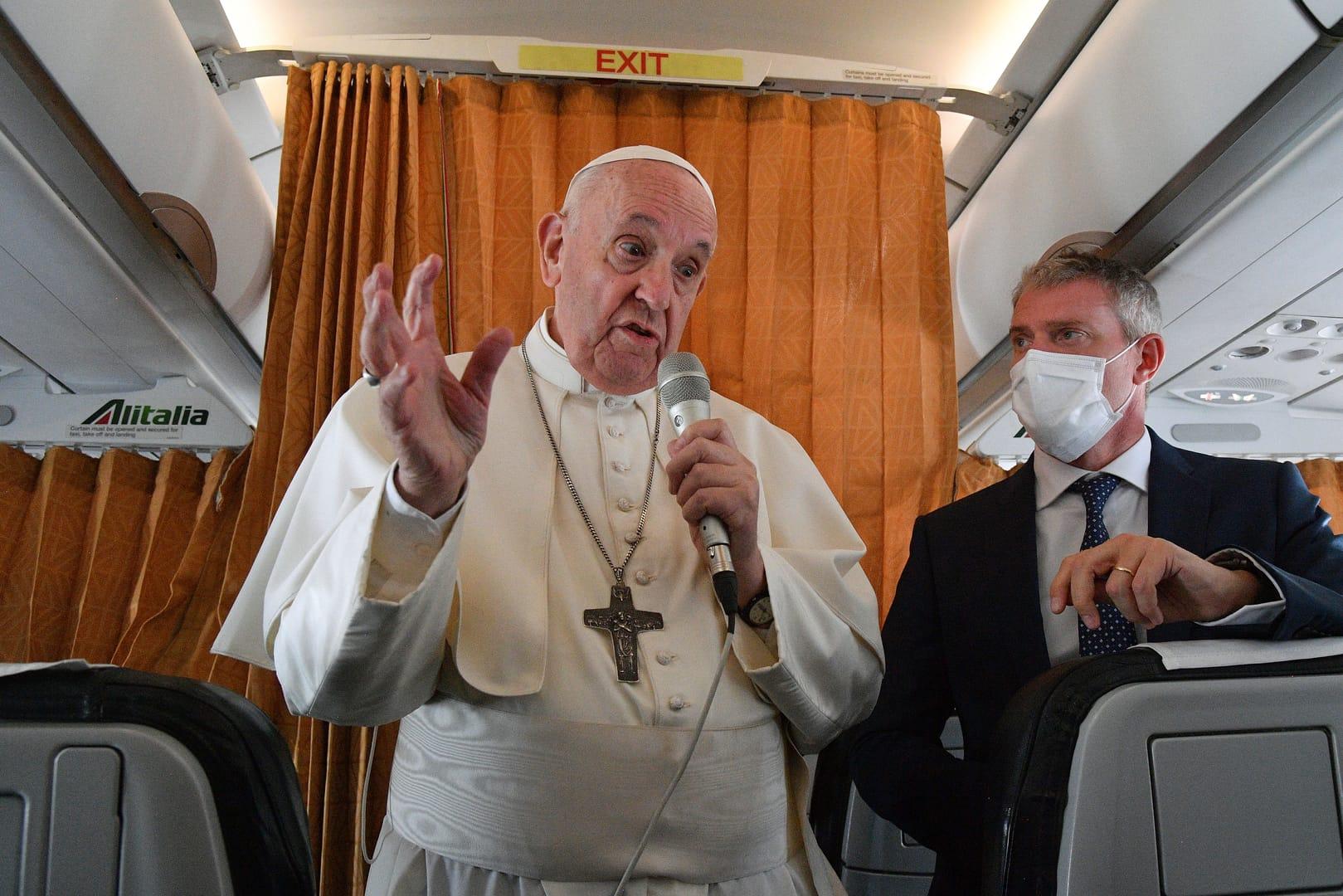ROME – Pope Francis delivered another of his impromptu airborne news conferences Wednesday on his return flight from Slovakia, and, as ever, it was fascinating. In part, it confirmed the pontiff’s reputation for answering questions in a style that’s both carefully nuanced and practically imprecise, so that no one party to a debate ever is quite able to claim vindication.
Yesterday’s leading example was a question on the vexed issue of communion for pro-choice Catholic politicians, which flared up most recently within the US bishops’ conference vis-à-vis President Joe Biden.
The pontiff emphasized he wouldn’t speak about the situation in the US directly because “I don’t know the details.”
Francis began by saying he’s never refused communion to anyone, adding a story about a visit to an old folks’ home as a young priest in which he asked if everyone wanted to receive communion. They all said yes, as Francis told the story, and later one woman came up to him and said (apparently in earnest), “Thanks, Father, I’m Jewish.”
The thrust appeared to be Francis distancing himself from turning anyone away.
Yet Francis immediately cut in a different direction, stating flatly that abortion is “murder” because a fetus’s organs are fully formed at three weeks and it’s a human life. Anyone who’s excommunicated, he said, by implication for participation in the crime of abortion, is outside the community of Jesus and thus cannot have communion.
On its own, that might sound like a green light for communion bans on Biden and other Catholic Democrats who uphold abortion rights.
Then Francis zigged again, first with a distinction between people who are “excommunicated,” apparently intending to mean definitively, and those who are “temporarily outside of the community” but still “children of God and need our pastoral action.”
He then introduced yet another distinction, this one between the pastoral and the political.
In a nutshell, he said that bishops must model the tenderness and compassion of God even in their dealings with people who are excommunicated, and that if a bishop abandons that path, he “becomes a politician.”
Weaving those points together, it’s reasonable to conclude the pope’s position is this: Abortion is murder, those who participate in abortion are at least temporarily excommunicated, and, as such, generally should not receive communion. However, a priest or bishop should not be the one to turn such a person away, because it risks turning what should be a compassionate pastoral response to failure into a political statement.
In other words, “no” to abortion and “no” to communion bans.
As I say, that’s at least a reasonable interpretation of the pope’s answer Tuesday. Yet because he didn’t say it quite so explicitly or unambiguously, there no doubt will be multiple other readings, and the great Catholic game of parsing the pope will roll on. Certainly neither side in the US debate can clearly assert “the pope’s with us” just on the back of this answer.
Or, consider Francis’s response when he was asked about gay marriage.
In effect, the pope said marriage is a sacrament and the church has no power to change a sacrament. However, he also spoke approvingly of “laws that try to help the situation of many people of different sexual orientations,” saying “it’s important to help people in this.”
The pope stressed that such an effort to accommodate people must not involve expecting the church to “give something that, due to its nature, the Church doesn’t give.”
“This doesn’t mean to condemn people who are like this, please, they are our brothers and sisters and we have to accompany them, but matrimony as a sacrament is clear. If there are civil laws that want to provide health services for them, they do these things…Matrimony as a sacrament is a man and a woman.”
Now, imagine you’re a Catholic bishop somewhere in the world where gay marriage as a civil, not sacramental, matter is already the law of the land, and the pastoral question is what “accompanying” someone in such a situation means.
Specifically, probably the most-debated pastoral question of the day is whether the church can offer blessing ceremonies for these gay marriages – not a celebration of the Catholic sacrament of marriage, but a blessing bestowed on a civil act?
Though there’s certainly food for thought in what Francis had to say yesterday, what you obviously won’t find is a clear answer to that question.
One could go on – trying to discern exactly what message Francis was trying to deliver with regard to Hungary’s right-wing, anti-immigrant populist Prime Minister Viktor Orbán, probably is an exercise best left to the Hungarians. I will say, though, that had Francis wanted to say something nice, he certainly had his chances.
Back in October 2013, after Pope Francis’s first conversation with longtime Italian journalist Eugenio Scalfari, then-Vatican spokesman Father Federico Lombardi suggested that when Francis interacts with the press, we’re dealing with a new genre in papal speech, one that’s deliberately informal, often unconcerned with precision, and intended to be taken as a pastoral reaction in the heat of the moment rather than a definitive declaration of magisterial authority.
Lombardi said then that we needed to come to terms with the nature of this genre before we can react to it appropriately. Arguably that learning process is still underway, with Wednesday’s airborne exchange offering the latest grist for the mill.
Follow John Allen on Twitter: @JohnLAllenJr
















